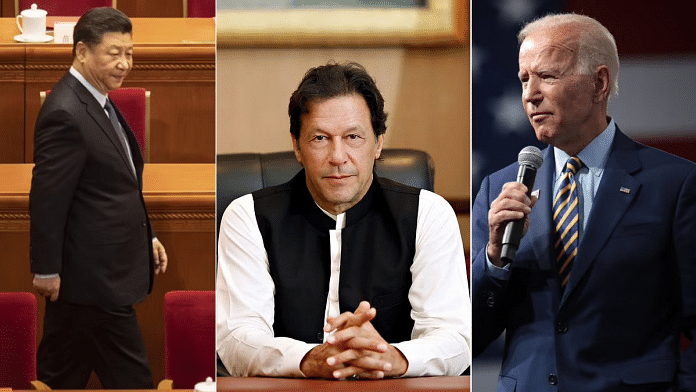Islamabad: Pakistan Prime Minister Imran Khan on Thursday trashed the emerging Cold-War mentality and said that his country did not want to be a part of any political bloc but instead wanted to play a role in bridging the gaps between the United States and China.
Addressing the Islamabad Conclave 2021, with the theme of “Peaceful and Prosperous South Asia”, Khan talked about the threat of a new Cold War between China and the US as well as his vision for peace in the region.
“The situation is going towards a (new) Cold War and blocs are forming, Khan said. “Pakistan should try its best to stop the formation of these blocs because we should not become a part of any bloc.”
He said that the world, as well as Pakistan, suffered due to the rivalry between the superpowers in the past and it was against any new confrontation.
He said Pakistan tried to reduce tension between arch-rival Saudi Arabia and Iran and both countries appreciated that we tried our best during a very critical phase where conflict could have occurred between them.”
Khan said that Pakistan enjoyed good ties with China and the US, and wanted to play a similar role in the current tension in US-China relations to “stop their growing distances”.
The relations between the US and China are at an all-time low. The two countries are engaged in a bitter confrontation over various issues, including trade, Beijing’s aggressive military moves in the disputed South China Sea and human rights in Hong Kong, Tibet and Xinjiang region.
Khan’s comments came as Pakistan skipped the Democracy Summit hosted by US President Joe Biden, who invited around 110 countries to a virtual summit on December 9-10.
Pakistan’s all-weather ally, China, has not been invited to attend the Summit.
Though Pakistan didn’t give any solid reason for refusing to attend the key summit, it is believed that it was in reaction to the US inviting Taiwan instead of Beijing, which was against the One China policy pursued by Islamabad.
Pakistan took the big step to refuse the invitation but it knows the limits of its power and Khan’s remarks are apparently an effort to play down the likely reaction. Islamabad is in the process of restoring a USD 6 billion loan from the IMF for which it may need Washington’s support.
Also read: Imran Khan has a set interview template — Biden’s phone call to China’s Uyghur genocide
Pakistan-US ties are on uneven keel as despite efforts, President Biden has not made a direct contact to Prime Minister Khan, irking the Pakistan government. Khan was also not invited for a key summit on environment.
Khan’s remarks are reminiscent of Pakistan’s role to establish contacts between the US and China in 1971 and pave the way for formal diplomatic relations between the two countries.
Khan in his speech also talked about ties with India, reiterating that Kashmir was the biggest issue that was keeping peace in South Asia “hostage”. He also emphasised that Pakistan tried to reach out to India for peace but without any positive response.
He said that after the Kashmir dispute is solved, other issues could be jointly tackled including smog and pollution. “Until both countries don’t sit together, no matter how much we do in Lahore [to control smog] we will only solve half the problem, he said.
Tensions between India and Pakistan have spiked since New Delhi abrogated Article 370 of the Constitution to revoke the special status of Jammu and Kashmir on August 5, 2019.
India has categorically told the international community that the scrapping of Article 370 was its internal matter. It also advised Pakistan to accept the reality and stop all anti-India propaganda.
India has also told Pakistan that it desires normal neighbourly relations with Islamabad in an environment free of terror, hostility, and violence.
Khan also said that both Pakistan and India were vulnerable to climate change.
“Our futures are connected. We both should focus on climate change together but till now I’m not seeing that seriousness in world leaders because their commercial interests are clashing with steps needed to stop climate change,” he said.
Khan urged for adopting an approach of regional development by increasing trade and solving political differences. He said those who try to solve issues through military means commit a mistake as was evident in the case of Afghanistan.
The two-day Islamabad Conclave 2021 seminar was organised by the Institute of Strategic Studies Islamabad (ISSI) think-tank.—PTI
Also read: No Biden-Imran call, ‘solidarity’ with China — why Pakistan opted out of US Summit for Democracy



